2 aug 2016

Israeli minister Tzachi Hanegbi said on Saturday that hundreds or maybe thousands of Yemenite children had been abducted from their poor parents, who migrated to Israel in the 1950s.
"They took the children, and gave them away. I don’t know where," Hanegbi told Israeli Channel 2.
Hanegbi, who was tasked with reviewing archived material on the issue, said he hoped the disclosures would provide answers to the long-standing questions about the fate of the children.
"One question left unanswered was whether the Israeli establishment [at the time] was aware of, or even complicit in the affair. We may never know," he said.
Last month, Israeli premier Benjamin Netanyahu said that "the issue of the Yemenite children is an open wound that continues to bleed in many families who do not know what happened to their children and are looking for the truth."
For their part, the Yemenite families believe their children disappeared as the result of a secret, official policy by which they were given to childless Ashkenazi Holocaust survivors.
Over the past several decades, the government has delegated three investigative committees to probe the case, with all concluding the majority of Yemenite children died in hospitals and medical centers and were simply buried without their families being informed.
The last committee that probed the issue in 2001 reached similar conclusions, but sealed various testimonies from the probe in the state archive until 2071.
Recently, several groups have urged the government to declassify the documents concerning the issue, arguing that if several hundred children indeed died, the government should have nothing to hide.
Between 1948-1954, thousands of Yemenite children were taken, sometimes forcibly, from their biological parents while in hospitals or child-care homes.
These children were then sold both in Israel and abroad for substantial sums or given out for adoption. Their parents, however, were told that the children had died.
In most cases, when the parents asked about the cause of death or requested a death certificate, or other documentation confirming the death of their children, they were ignored and their requests went unanswered.
They were never showed a body or a burial spot. In a few cases, however, graves were shown to some families. Some of those graves, later on, were dug up by parents, who did not believe their children died, and found empty.
"They took the children, and gave them away. I don’t know where," Hanegbi told Israeli Channel 2.
Hanegbi, who was tasked with reviewing archived material on the issue, said he hoped the disclosures would provide answers to the long-standing questions about the fate of the children.
"One question left unanswered was whether the Israeli establishment [at the time] was aware of, or even complicit in the affair. We may never know," he said.
Last month, Israeli premier Benjamin Netanyahu said that "the issue of the Yemenite children is an open wound that continues to bleed in many families who do not know what happened to their children and are looking for the truth."
For their part, the Yemenite families believe their children disappeared as the result of a secret, official policy by which they were given to childless Ashkenazi Holocaust survivors.
Over the past several decades, the government has delegated three investigative committees to probe the case, with all concluding the majority of Yemenite children died in hospitals and medical centers and were simply buried without their families being informed.
The last committee that probed the issue in 2001 reached similar conclusions, but sealed various testimonies from the probe in the state archive until 2071.
Recently, several groups have urged the government to declassify the documents concerning the issue, arguing that if several hundred children indeed died, the government should have nothing to hide.
Between 1948-1954, thousands of Yemenite children were taken, sometimes forcibly, from their biological parents while in hospitals or child-care homes.
These children were then sold both in Israel and abroad for substantial sums or given out for adoption. Their parents, however, were told that the children had died.
In most cases, when the parents asked about the cause of death or requested a death certificate, or other documentation confirming the death of their children, they were ignored and their requests went unanswered.
They were never showed a body or a burial spot. In a few cases, however, graves were shown to some families. Some of those graves, later on, were dug up by parents, who did not believe their children died, and found empty.
14 july 2016
|
|
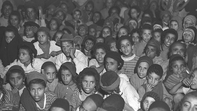
Immigrants from Yemen in the 50s
The minister responsible for investigating the classified documents has asked the Shin Bet and Mossad heads to clear them for publishing on a publicly accessible website. Minister without Portfolio Tzachi Hanegbi (Likud), responsible for investigating the classified parts of the minutes regarding the kidnapping of Yemenite children, has asked the heads of the Shin Bet and Mossad declassify the testimony of former Shin Bet chief Amos Manor. Manor headed the security body from 1953 to 1963. Hanegbi saw the requested minutes that were kept behind closed doors from 1995 to 2001. |
Hanegbi then asked for assistance from Shin Bet chief Nadaz Argaman and Mossad chief Yossi Cohen in determining the involvement of their two agencies in the matter, which took place at the foundation of the state of Israel.
Hanegbi's position is that the Mossad and Shin Bet have no right to keep this evidence and testimony secret, but he wanted to get the positions of the directors and their recommendations.
Hanegbi's position is that the Mossad and Shin Bet have no right to keep this evidence and testimony secret, but he wanted to get the positions of the directors and their recommendations.
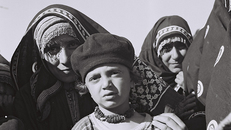
The minister is expected to recommend that the government declassify the minutes documenting the disappearances of the Yemenite children, barring those that are subject to adoption privacy laws.
He is also expected to recommend that a special webpage be set up where the entirety of the minutes can be read by the public.
Hanegbi's appointment to the position came as a result of public pressure and families' claim that previous governments have conspired to whitewash the reports of different investigations into the matter.
Hanegbi visited the State Archives with State Archivist Dr. Yaakov Lezubik, director of the Ministry of Justice's Freedom of Information Unit Rivkie Dvash, and legal counsel to the State Archives Naomi Aldouby. The visit took place for Hanegbi to determine the procedures for the relevant committee to examine the material.
Hundreds of containers containing more than a million and a half sheets of testimonies, transcripts, documents, minutes, and data from hospitals, the Ministry of the Interior, a burial society, the Ministry of Health, and other sources were sent on Hanegbi's instructions for digital scanning so they can be centralized on a website open to the public.
He is also expected to recommend that a special webpage be set up where the entirety of the minutes can be read by the public.
Hanegbi's appointment to the position came as a result of public pressure and families' claim that previous governments have conspired to whitewash the reports of different investigations into the matter.
Hanegbi visited the State Archives with State Archivist Dr. Yaakov Lezubik, director of the Ministry of Justice's Freedom of Information Unit Rivkie Dvash, and legal counsel to the State Archives Naomi Aldouby. The visit took place for Hanegbi to determine the procedures for the relevant committee to examine the material.
Hundreds of containers containing more than a million and a half sheets of testimonies, transcripts, documents, minutes, and data from hospitals, the Ministry of the Interior, a burial society, the Ministry of Health, and other sources were sent on Hanegbi's instructions for digital scanning so they can be centralized on a website open to the public.
7 july 2016
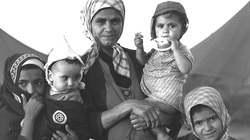
The report from the Kedmi Committee, which looked into the disappearances of children of Jewish Yemenite immigrants between 1948–1954, is now accessible online; the report contains ‘disturbing information on the ease with which infants were hospitalized without supervision, documentation and at times without allowing family members to visit.’
An online version of the Kedmi Committee’s official report on the disappearances of children of Yemenite immigrants was published on Thursday.
The report was initially released in 2001, but was made available online via the National Library’s website following a more recent public demand to have access to the committee’s confidential protocols, as well. Despite the public outcry, the protocols themselves will remain sealed by government decree for several more decades, until the year 2071.
Nevertheless, the report that has been made public contains several disturbing cases. One such recorded incident describes “A mother who had made aliyah while eight months pregnant, who gave birth to her son in a tent for fear that he would be kidnapped. At the request of the father, the boy, named Yair, was brought to the nursery at camp to be circumcised, where he disappeared. The parents were told that he had died, and when they insisted on being shown the body, they were presented with the body of a 16-year-old. They never got to see their son’s body.”
The committee, headed by Judge Jacob Kedmi, did not find a factual basis to verify the systematic and organized kidnapping of the children. It did, however, find several cases where children were given up for adoption without the parents’ knowledge or consent. Regarding such cases, the committee accepted the claim that the children given up for adoption were living in institutions without any connection to their birth parents.
The National Library stated that the report unearthed important and disturbing information on “the ease with which infants were hospitalized without supervision, documentation and at times without allowing family members to visit.” Among other points, the committee described how many children were buried without the notification of their parents.
Though the committee stated that in certain cases the records in its possession “clearly show that the child had passed away,” it admitted that it “lacks any information that could point to a cause of death, date of death or place of burial.”
An online version of the Kedmi Committee’s official report on the disappearances of children of Yemenite immigrants was published on Thursday.
The report was initially released in 2001, but was made available online via the National Library’s website following a more recent public demand to have access to the committee’s confidential protocols, as well. Despite the public outcry, the protocols themselves will remain sealed by government decree for several more decades, until the year 2071.
Nevertheless, the report that has been made public contains several disturbing cases. One such recorded incident describes “A mother who had made aliyah while eight months pregnant, who gave birth to her son in a tent for fear that he would be kidnapped. At the request of the father, the boy, named Yair, was brought to the nursery at camp to be circumcised, where he disappeared. The parents were told that he had died, and when they insisted on being shown the body, they were presented with the body of a 16-year-old. They never got to see their son’s body.”
The committee, headed by Judge Jacob Kedmi, did not find a factual basis to verify the systematic and organized kidnapping of the children. It did, however, find several cases where children were given up for adoption without the parents’ knowledge or consent. Regarding such cases, the committee accepted the claim that the children given up for adoption were living in institutions without any connection to their birth parents.
The National Library stated that the report unearthed important and disturbing information on “the ease with which infants were hospitalized without supervision, documentation and at times without allowing family members to visit.” Among other points, the committee described how many children were buried without the notification of their parents.
Though the committee stated that in certain cases the records in its possession “clearly show that the child had passed away,” it admitted that it “lacks any information that could point to a cause of death, date of death or place of burial.”
26 june 2016
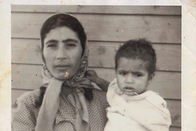
By Tom Mehager
Between 1948 and 1952, thousands of Yemenite babies, children of immigrants to the newly-founded State of Israel were reportedly taken from their parents by Israel’s nascent medical establishment and disappeared. Now it is time for the state to come clean about what really happened.
In all our innocence we believed that if we bring forth testimonies from families on the ways their children were kidnapped, we could begin a process of social healing, collective truth telling, and in the far-off future, reconciliation. But the response of many Ashkenazi Israelis to the Day of Remembrance and Awareness for the Yemenite, Balkan and Mizrahi Children Affair was one of distortions and victimization. Thus, it is important to reiterate a number of basic facts.
The three separate investigative commissions were flooded with over one thousand testimonies by families whose children were taken from them. Those testimonies were most often consistent: medical personnel told the families that the child was sick, the child was taken from the family and after a number of days was reported dead. The families were neither handed a death certificate nor told where the child had been buried. Today hundreds of families are providing testimonies to Amram, an NGO dedicated to researching the disappearance and trafficking of Jewish children from Yemen, the Balkans and Arab countries, while hundreds of others took part in last week’s events across the country to mark the day of remembrance. Those who refuse to believe these testimonies should, by the same token, refuse to believe testimonies of Holocaust survivors.
Those who bother to read materials on the subject will discover that there are testimonies by members of the Israeli establishment that reinforce those of the families. Take, for instance, the testimony given by Ahuva Goldfarb, the national supervisor of the Jewish Agency’s social services, to the national commission of inquiry: “Children were sent unregistered outside of the [transit] camps, it was systematic as could be.” Goldfarb admits that the answer given to parents who asked about their child’s fate was “He is no longer alive.” Roja Kushinsky, a nurse at the Ein Shemer transit camp, recalls a similar pattern: “I would take two-three babies, then they would send me to Afula on an ambulance, I would be left with healthy babies. The next day I would do the same thing and ask about the babies from the day before. I was told they died. Died?! But they were healthy. They said they passed away. It’s not true. It’s not true. They were given up for adoption.”
Questions about the fate of these children must be directed at the state — it must carry the full burden of this issue. There are serious suspicions that these children were sold abroad for all kinds of purposes. Eido Minkovsky, whose grandfather Reuven headed the Minkovsky-Bahlul Committee, which looked into allegations of kidnappings, responded to these testimonies on his personal Facebook page: “The Minkovsky-Bahlul Committee discovered the earth-rattling truth on the disappeared Yemenite children. They discovered over 300 dead!! For some reason that is not mentioned today when we know where they are, signed and marked.”
Between 1948 and 1952, thousands of Yemenite babies, children of immigrants to the newly-founded State of Israel were reportedly taken from their parents by Israel’s nascent medical establishment and disappeared. Now it is time for the state to come clean about what really happened.
In all our innocence we believed that if we bring forth testimonies from families on the ways their children were kidnapped, we could begin a process of social healing, collective truth telling, and in the far-off future, reconciliation. But the response of many Ashkenazi Israelis to the Day of Remembrance and Awareness for the Yemenite, Balkan and Mizrahi Children Affair was one of distortions and victimization. Thus, it is important to reiterate a number of basic facts.
The three separate investigative commissions were flooded with over one thousand testimonies by families whose children were taken from them. Those testimonies were most often consistent: medical personnel told the families that the child was sick, the child was taken from the family and after a number of days was reported dead. The families were neither handed a death certificate nor told where the child had been buried. Today hundreds of families are providing testimonies to Amram, an NGO dedicated to researching the disappearance and trafficking of Jewish children from Yemen, the Balkans and Arab countries, while hundreds of others took part in last week’s events across the country to mark the day of remembrance. Those who refuse to believe these testimonies should, by the same token, refuse to believe testimonies of Holocaust survivors.
Those who bother to read materials on the subject will discover that there are testimonies by members of the Israeli establishment that reinforce those of the families. Take, for instance, the testimony given by Ahuva Goldfarb, the national supervisor of the Jewish Agency’s social services, to the national commission of inquiry: “Children were sent unregistered outside of the [transit] camps, it was systematic as could be.” Goldfarb admits that the answer given to parents who asked about their child’s fate was “He is no longer alive.” Roja Kushinsky, a nurse at the Ein Shemer transit camp, recalls a similar pattern: “I would take two-three babies, then they would send me to Afula on an ambulance, I would be left with healthy babies. The next day I would do the same thing and ask about the babies from the day before. I was told they died. Died?! But they were healthy. They said they passed away. It’s not true. It’s not true. They were given up for adoption.”
Questions about the fate of these children must be directed at the state — it must carry the full burden of this issue. There are serious suspicions that these children were sold abroad for all kinds of purposes. Eido Minkovsky, whose grandfather Reuven headed the Minkovsky-Bahlul Committee, which looked into allegations of kidnappings, responded to these testimonies on his personal Facebook page: “The Minkovsky-Bahlul Committee discovered the earth-rattling truth on the disappeared Yemenite children. They discovered over 300 dead!! For some reason that is not mentioned today when we know where they are, signed and marked.”
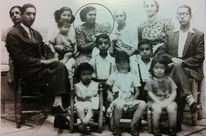
Minkowsky isn’t speaking the truth. Because state representatives took the children from their parents, and the medical establishment claimed the children had died, the state must be responsible to show the families exactly where they are buried.
As long as there are no graves with the children’s names, and no DNA test to match the deceased to their families, we cannot establish that the children died and were buried in Israel. Until today, the state has not opened any graves of its own initiative in order to prove that the children had died and were buried.
Therefore we can establish that the State of Israel has never actually given these families a proper response about the fate of their children. Moreover, we’re not talking about a few hundreds, but thousands. According to the Kedmi Committee, the number is somewhere between 1,500-5,000 children who disappeared — and this is only between 1948-1954.
These things seem obvious. From the beginning we did not doubt the reliability of the families, and claimed that the state is responsible for providing them with an answer. But the daniel and manipulation create an opposite effect. Instead of coming together and moving toward reconciliation, the last week only deepened the animosity between Mizrahim and Ashkenazim. One thing must be clear: we will keep going. Until the establishment fully recognizes the crimes committed against the families.
Tom Mehager is an activist with Amram. This article was first published in Hebrew on Haokets. Read it here.
As long as there are no graves with the children’s names, and no DNA test to match the deceased to their families, we cannot establish that the children died and were buried in Israel. Until today, the state has not opened any graves of its own initiative in order to prove that the children had died and were buried.
Therefore we can establish that the State of Israel has never actually given these families a proper response about the fate of their children. Moreover, we’re not talking about a few hundreds, but thousands. According to the Kedmi Committee, the number is somewhere between 1,500-5,000 children who disappeared — and this is only between 1948-1954.
These things seem obvious. From the beginning we did not doubt the reliability of the families, and claimed that the state is responsible for providing them with an answer. But the daniel and manipulation create an opposite effect. Instead of coming together and moving toward reconciliation, the last week only deepened the animosity between Mizrahim and Ashkenazim. One thing must be clear: we will keep going. Until the establishment fully recognizes the crimes committed against the families.
Tom Mehager is an activist with Amram. This article was first published in Hebrew on Haokets. Read it here.
22 june 2016

Jews making aliyah from Yemen in 1950
Senior legal source reveals to Yedioth Ahronoth the expected publication; over a million documents have to be read before this can actually occur; Netanyahu: 'It's time to know the truth and achieve justice.'
The details of the State Inquiry Commission into the Yemenite children affair, the mysterious disappearance of hundreds of Yemenite babies and toddlers between 1948 and 1954, are to be published within the coming months, according to a Yedioth Ahronoth senior legal source.
The publication will als be accompanied by the activities of the various ad hoc government committees set up to investigate the affair.
However, the families who have been awaiting answers about the fate of their loved ones for many years are far from solving the mystery as the personal information relating to the missing individuals will not be published.
According to the senior legal source, due to public pressure "this train has already left the station," and it is believed that Minister in the Prime Minister's Office Tzahi Hanegbi, appointed by Prime Minister Benjamin Netanyahu, will recommend that the government remove most of the confidentiality.
On Tuesday it was made clear that in the coming months Hanegbi would have to read over 1.5 million documents relating to the affair, in order to consolidate his recommendation to the government.
A senior legal source said on Tuesday that since the publishing of the minutes pose no risk to Israel's foreign relations and has no connection to Israel's national security, the two main criteria that will be taken into account are the public interest and the need to remove any personal information, revealing the names of children, or where they were sent so as to protect their right to privacy.
In any event, in cases in which it can be proved that children were put up for adoption, it will not be possible to publish the details since they are subject to strict confidentiality protecting those who were then children and their adoptive families. On the other hand, any information, evidence or documents attesting to a "method" of concealing the whereabouts of children must be published.
Those who assisted in kidnappings would be eligible, prior to the publication of incriminating evidence, to have a hearing. It was further clarified Tuesday that the Attorney General would also have to give his approval, ahead of the publication, to the unusual procedure, which is expected to be dealt with by the High Court as well.
Developments in the case came about Tuesday after the The Knesset Constitution, Law and Justice Committee deliberated over whether to publish the protocols of the Kedmi Committee, charged with investigating the Yemenite children affair. The Knesset membes provided unanimous consensus about the need to publish the hidden protocols.
The struggle, led by Nurit Koren (Likud), focuses on the demand that the material collected by the Kedmi Committee in the 1990s be published. Neverheless, a governmental order decreed that the committee's minutes remain classifed until 2071, a decision that can only be overturned by way of a government decision.
Dr. Yaakov Lazovic, from the Israel State Archives, said that the committee's work consists of more than a illion pages. "I personally, and the organization, would be very happy to disclose everything, but we work within the legal framework," Lazovic said. "The law imposes two restrictions: first, by virtue of the archives law and the second is the privacy law."
According to him, the government bears the legal authority to order the archives to declassify the material and thus circumvent the restrictions of the archives law. However, the government cannot allow the publication of material pertaining to individuals due to the privacy law. "We have to check what materials are there. If we get permission it will take us days to go through the material, and everywhere there is a person's name, it will have to be crossed out. There are more than 3,500 cases. I estimate this will involve 1000 days of work."
Following heavy pressure, Netanyahu published a video Tuesday supporting the struggle of the families affected by the affair saying, "The subject of the Yemenite children is an open wound that continues to bleed for many families who don’t know what happened to the infants, to the children who disappeared. They’re seeking the truth and want to know what happened and I think it's time to know and to achieve justice. Therefore, this lobby is important. Until this very moment I do not understand why there is confidentiality. We will review it and take care of it with your help."
Senior legal source reveals to Yedioth Ahronoth the expected publication; over a million documents have to be read before this can actually occur; Netanyahu: 'It's time to know the truth and achieve justice.'
The details of the State Inquiry Commission into the Yemenite children affair, the mysterious disappearance of hundreds of Yemenite babies and toddlers between 1948 and 1954, are to be published within the coming months, according to a Yedioth Ahronoth senior legal source.
The publication will als be accompanied by the activities of the various ad hoc government committees set up to investigate the affair.
However, the families who have been awaiting answers about the fate of their loved ones for many years are far from solving the mystery as the personal information relating to the missing individuals will not be published.
According to the senior legal source, due to public pressure "this train has already left the station," and it is believed that Minister in the Prime Minister's Office Tzahi Hanegbi, appointed by Prime Minister Benjamin Netanyahu, will recommend that the government remove most of the confidentiality.
On Tuesday it was made clear that in the coming months Hanegbi would have to read over 1.5 million documents relating to the affair, in order to consolidate his recommendation to the government.
A senior legal source said on Tuesday that since the publishing of the minutes pose no risk to Israel's foreign relations and has no connection to Israel's national security, the two main criteria that will be taken into account are the public interest and the need to remove any personal information, revealing the names of children, or where they were sent so as to protect their right to privacy.
In any event, in cases in which it can be proved that children were put up for adoption, it will not be possible to publish the details since they are subject to strict confidentiality protecting those who were then children and their adoptive families. On the other hand, any information, evidence or documents attesting to a "method" of concealing the whereabouts of children must be published.
Those who assisted in kidnappings would be eligible, prior to the publication of incriminating evidence, to have a hearing. It was further clarified Tuesday that the Attorney General would also have to give his approval, ahead of the publication, to the unusual procedure, which is expected to be dealt with by the High Court as well.
Developments in the case came about Tuesday after the The Knesset Constitution, Law and Justice Committee deliberated over whether to publish the protocols of the Kedmi Committee, charged with investigating the Yemenite children affair. The Knesset membes provided unanimous consensus about the need to publish the hidden protocols.
The struggle, led by Nurit Koren (Likud), focuses on the demand that the material collected by the Kedmi Committee in the 1990s be published. Neverheless, a governmental order decreed that the committee's minutes remain classifed until 2071, a decision that can only be overturned by way of a government decision.
Dr. Yaakov Lazovic, from the Israel State Archives, said that the committee's work consists of more than a illion pages. "I personally, and the organization, would be very happy to disclose everything, but we work within the legal framework," Lazovic said. "The law imposes two restrictions: first, by virtue of the archives law and the second is the privacy law."
According to him, the government bears the legal authority to order the archives to declassify the material and thus circumvent the restrictions of the archives law. However, the government cannot allow the publication of material pertaining to individuals due to the privacy law. "We have to check what materials are there. If we get permission it will take us days to go through the material, and everywhere there is a person's name, it will have to be crossed out. There are more than 3,500 cases. I estimate this will involve 1000 days of work."
Following heavy pressure, Netanyahu published a video Tuesday supporting the struggle of the families affected by the affair saying, "The subject of the Yemenite children is an open wound that continues to bleed for many families who don’t know what happened to the infants, to the children who disappeared. They’re seeking the truth and want to know what happened and I think it's time to know and to achieve justice. Therefore, this lobby is important. Until this very moment I do not understand why there is confidentiality. We will review it and take care of it with your help."
8 may 2016
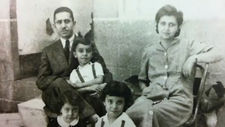
Activists intend to petition Supreme Court to release key documents on Yemenite Children affair, which may prove that thousands of babies were kidnapped after state's founding
The Yemenite Children affair has resurfaced once again in the public debate following the Achim Vekayamim organization’s stated intention to renew efforts to discover the truth behind one of the cases, which has caused a storm in Israel for decades.
The governmental investigative committee on the mysterious disappearance of Yemeni children classified documents and materials about the case that were classified in 2001. Achim Vekayamim, which comprises dozens of Yemenite family members who were either allegedly kidnapped (or parents of those allegedly kidnapped), announced its intention to petition the Supreme Court to provide access to these files.
The Yemenite Children affair raised much suspicion in Israel after hundreds of babies and toddlers belonging to Yemenite immigrants to the newly founded state between 1948 and 1954 were said to be kidnapped and sold to Ashkenazi families. The parents were reportedly informed that their children had died in the hospital. However, some of the children later sought to track their biological families and discovered DNA matches. Suspicions were further vindicated when parents received military draft orders when their “deceased” children would have reached 18 years old—an indication that they were still, in fact, recorded as alive.
The case shifted back into public scrutiny when families began protesting the state's decision to classify the material reviewed by the investigative committee for 70 years (until 2071), which was announced yesterday on Channel 2. Justice Minister Ayelet Shaked announced Saturday that she would again assess the material and make a decision thereafter.
Journalist Yael Tzadok, who began investigating the case in 1994, and who is also an activist for the victims, said that the state has been “hiding the kidnapping case for almost 60 years. (The affair) already began in the 1950s. We know about governmental letters which were passed between the Health Ministry and the police that were stamped ‘top secret.’ They knew this and hid it.”
“Also during the Knesset meetings in which the subject was raised,” Tzadok continued, “and clearly from the minutes, it is clear that many public figures knew the children had disappeared, were kidnapped, and even sold. A catalogue with 20,000 names of Yemenite children containing details about them also disappeared. The state needs to remove the classification orders from the documents and to finally tell the truth to the families who were victims of kidnappings and also to the entire public. They can’t lie to everyone forever.”
The activists contend that the state’s decision to classify the evidence, the documents, the inutes and the investigative material is without precedent. “Obviously it raises suspicion that we are talking about a more serious case than we can imagine,” Tzadok said. “This is a committee that pretended that it was going to investigate and to expose the truth. Yet what was discovered was the systematic destruction of evidence and witnesses are afraid to talk about about the classification of the documents."
The organization’s lawyer, Yael Neger, who is providing the activists with pro bono legal service, says that she has personal experience in the affair. “They also tried to kidnap my father. They forcefully took him from my grandmother's hands, but this attempt did not succeed,” explained Neger. She further threatened that if the state refused to declassify the relevant documentation, more than 100 families would petition the Supreme Court against the decision.
The Yemenite Children affair has resurfaced once again in the public debate following the Achim Vekayamim organization’s stated intention to renew efforts to discover the truth behind one of the cases, which has caused a storm in Israel for decades.
The governmental investigative committee on the mysterious disappearance of Yemeni children classified documents and materials about the case that were classified in 2001. Achim Vekayamim, which comprises dozens of Yemenite family members who were either allegedly kidnapped (or parents of those allegedly kidnapped), announced its intention to petition the Supreme Court to provide access to these files.
The Yemenite Children affair raised much suspicion in Israel after hundreds of babies and toddlers belonging to Yemenite immigrants to the newly founded state between 1948 and 1954 were said to be kidnapped and sold to Ashkenazi families. The parents were reportedly informed that their children had died in the hospital. However, some of the children later sought to track their biological families and discovered DNA matches. Suspicions were further vindicated when parents received military draft orders when their “deceased” children would have reached 18 years old—an indication that they were still, in fact, recorded as alive.
The case shifted back into public scrutiny when families began protesting the state's decision to classify the material reviewed by the investigative committee for 70 years (until 2071), which was announced yesterday on Channel 2. Justice Minister Ayelet Shaked announced Saturday that she would again assess the material and make a decision thereafter.
Journalist Yael Tzadok, who began investigating the case in 1994, and who is also an activist for the victims, said that the state has been “hiding the kidnapping case for almost 60 years. (The affair) already began in the 1950s. We know about governmental letters which were passed between the Health Ministry and the police that were stamped ‘top secret.’ They knew this and hid it.”
“Also during the Knesset meetings in which the subject was raised,” Tzadok continued, “and clearly from the minutes, it is clear that many public figures knew the children had disappeared, were kidnapped, and even sold. A catalogue with 20,000 names of Yemenite children containing details about them also disappeared. The state needs to remove the classification orders from the documents and to finally tell the truth to the families who were victims of kidnappings and also to the entire public. They can’t lie to everyone forever.”
The activists contend that the state’s decision to classify the evidence, the documents, the inutes and the investigative material is without precedent. “Obviously it raises suspicion that we are talking about a more serious case than we can imagine,” Tzadok said. “This is a committee that pretended that it was going to investigate and to expose the truth. Yet what was discovered was the systematic destruction of evidence and witnesses are afraid to talk about about the classification of the documents."
The organization’s lawyer, Yael Neger, who is providing the activists with pro bono legal service, says that she has personal experience in the affair. “They also tried to kidnap my father. They forcefully took him from my grandmother's hands, but this attempt did not succeed,” explained Neger. She further threatened that if the state refused to declassify the relevant documentation, more than 100 families would petition the Supreme Court against the decision.
Page: 2 - 1
